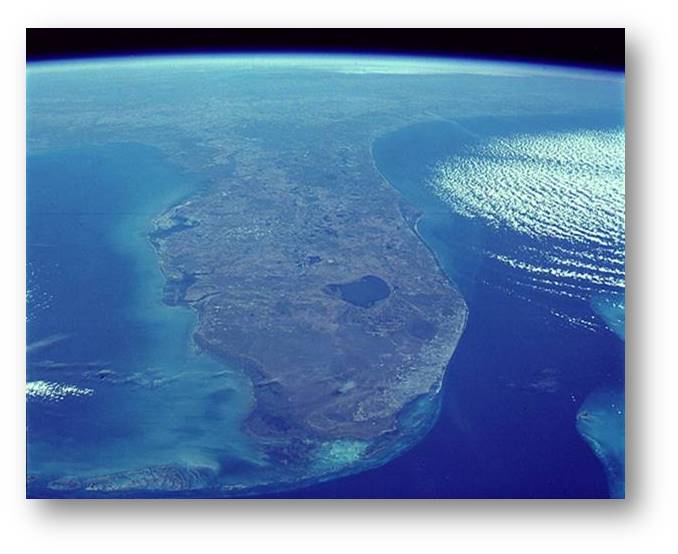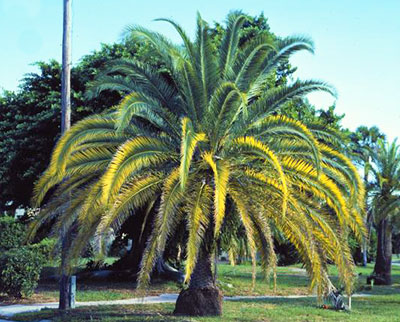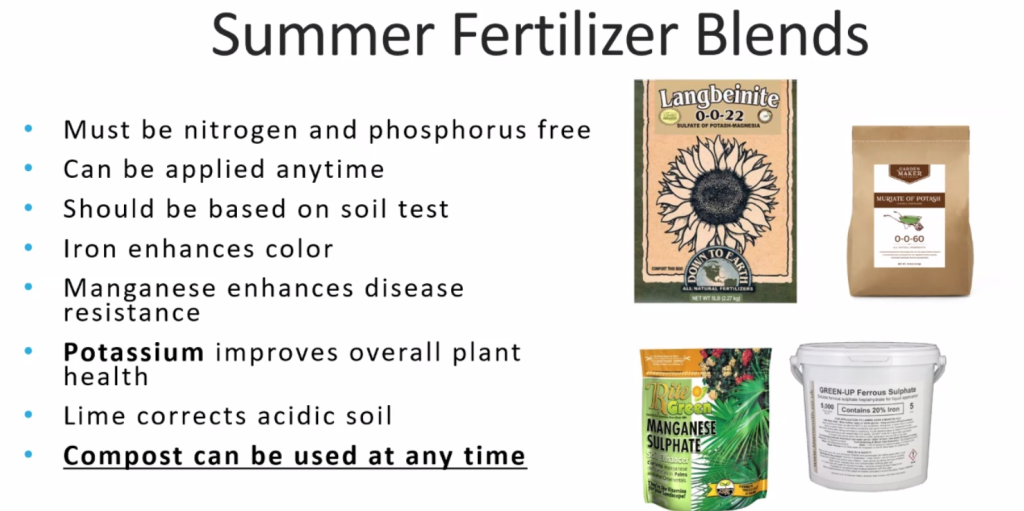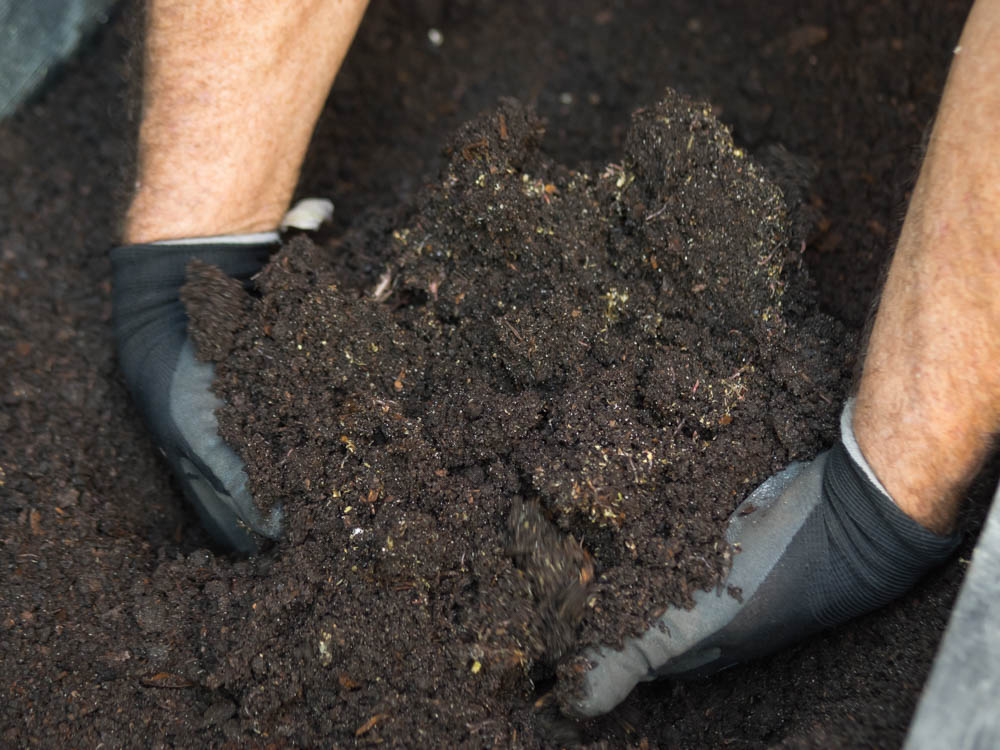
The Orange County fertilizer ordinance (and most other counties in Florida) prohibits application of nitrogen and phosphorus because they contribute to degradation of our precious water bodies in Central Florida. In Orange County, 104 of our 600 water bodies are impaired. To learn more about our water bodies, visit the Water Atlas. The restricted season runs from June 1st until Sept. 30th, which corresponds with our summer rainy season. During that time period you have the choice not to fertilize at all or choose fertilizers or other soil amendments with an analysis of zero nitrogen and zero phosphorus. When you look at a fertilizer bag the three numbers represent the N-P-K, nitrogen, phosphorus and potassium. To find analysis of the other nutrients you will have to look closely at the label. Remember to always follow label instructions when applying any kind of fertilizer.
Plant Nutrients
Plants need 17 essential elements to perform their life cycles. Carbon (C), hydrogen (H), and oxygen (O) are provided by air and water, and they are readily available therefore do not need to be supplied to the plants. Macronutrients such as nitrogen (N), phosphorus (P), potassium (K), sulfur (S), calcium (Ca), and magnesium (Mg) are needed in large quantities. The micronutrients are needed, but in very small quantities. They include manganese (Mn), iron (Fe), boron (B), zinc (Zn), copper (Cu), molybdenum (Mo), chlorine (Cl), and nickel (Ni). The law requires fertilizer labels to list the guaranteed analysis on all fertilizer bags, this is the minimum percentage of each nutrient. To learn more, see our EDIS publication on Plant Essential Nutrients and their Role.

Blackout Compliant Fertilizers
Commercially available summer blend fertilizers are now entering the market. To choose a Florida-Friendly blackout compliant fertilizer the analysis would look something like 0-0-8. Before adding fertilizers, its best to get a soil test to see if your soil is lacking any nutrients. Potassium does not harm water bodies and is often deficient in our soils that is needed in large quantities. Kelp meal is good organic source of potassium and trace minerals. Iron is another product that can be applied to lawns and landscape to help nourish plants and green up the lawn. In palms, micronutrient deficiencies are common, and applications of magnesium or manganese may benefit the plants health. The photo on the first page shows Magnesium deficiency in a date palm, to correct this apply palm fertilizer every 3 months and during the restricted season find a fertilizer with no nitrogen or phosphorus. Micronutrients can be applied as a single nutrient, for example magnesium sulfate, or as part of a micronutrient blend. Rock dust is an example of an organic source of trace minerals.

Probiotics for Plants
Another component that helps with plant health is the beneficial microbes, the bacteria, fungi, and other microscopic organisms or “microbes” that live in the soil and feed on organic matter. These microbes are a good indicator of soil health and can help protect your plants from disease and enhance nutrient uptake by converting nutrients in the soil to plant available forms. Soil life is not measured as part of a standard soil test; however they can be seen with a microscope. Think of them as probiotics for plants, as they help the plants thrive. There are some products that can be purchased or made on your own to add microbes including compost, worm castings, and microbial sprays. Adding organic matter such as compost will also increase the nutrient holding ability of your soil. Learn more in our new EDIS publication Soil Health and Fertility of Florida-Friendly Edible Landscapes.

Non-fertilizer Soil Amendments
While products that are technically classified as “fertilizers” must be tested and confirmed for their guaranteed analysis, there are many other “non-fertilizer” products that can help with soil fertility. These typically include composts, worm castings or other soil amendments that do not list the N-P-K, secondary or micronutrients. While composts and other products do still contain small amounts of nutrients, it’s generally assumed to be <1% and OK to apply during the restricted season in reasonable amounts. Recommendations from UF/IFAS researchers are still being developed on products such as silica, humic acids, and biochar. Although University of Florida currently has three EDIS publications on biochar, the recommendations for application still depend on the soil pH, soil structure, and feedstock material of the biochar. Biochar generally works best or poor quality, acidic soils.
The take home message here is to choose products that can keep your plants green and our waters clean. Learn more about the Orange County fertilizer ordinance.
Want to learn more? Check out horticulture classes offered by UF/IFAS Extension Orange County at www.ocextension.eventbrite.com. Read about Florida-Friendly Landscaping™ https://ffl.ifas.ufl.edu/. Follow us on Facebook https://www.facebook.com/GardenFlorida/, Instagram https://www.instagram.com/oc_extension/ and visit our website https://sfyl.ifas.ufl.edu/orange/home-lawns-landscapes-and-gardens/florida-friendly-landscaping/.
 1
1
